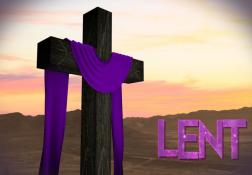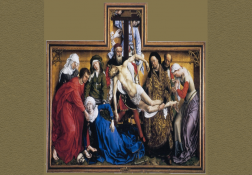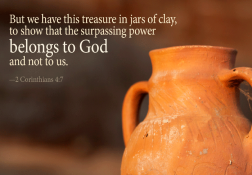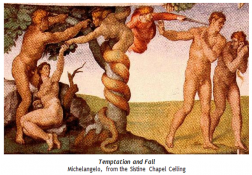You are here
 March 21 2015
Late Lines at Lent
March 21 2015
Late Lines at Lent
I scarcely know my heart's disease
And how I live, my will to please.
I breach your will with complacent ease.
 March 19 2015
He Was Crucified, Dead, and Buried: Hebrews 9:14-28
March 19 2015
He Was Crucified, Dead, and Buried: Hebrews 9:14-28
The letter to the Hebrews sees the death of Jesus as the perfect offering to "cleanse our consciences from acts that lead to death, so that we may serve the living God." He is the High Priest who is the mediator who "died as a ransom to set us free from sins committed." His blood shed enabled us to receive forgiveness.
Read more March 14 2015
TREASURE IN JARS OF CLAY: 2 Corinthians 4:7-15
March 14 2015
TREASURE IN JARS OF CLAY: 2 Corinthians 4:7-15
But "this-world orientation" and all that it implies in hanging on to our mortal life at all costs is threatened by the reality of daily life. We are "jars of clay". The jars of clay are the human body -- our temporal existence -- which is subject to decay and vulnerable to disease and injury -- fragile. Our earthly life is short, easily shattered and destroyed in a moment of time. Clay cracks and breaks when exposed to the elements or dropped on a hard surface.
Read more March 12 2015
The Serpent's Wisdom
March 12 2015
The Serpent's Wisdom
"Be wise as serpents, innocent as doves," Jesus told the Twelve as He sent them out to heal the sick. Jesus' use of these metaphors is puzzling. The serpent of course was the craftiest of God's creatures in the garden, but Jesus doesn't say "crafty as serpents"-- he says "wise." And the dove as symbol of the Holy Spirit and airborne messenger that the flood had passed was scarcely innocent as we might use the word.
Read more March 05 2015
Dealing with Discouragement and Despair: 2 Corinthians 4:1-6
March 05 2015
Dealing with Discouragement and Despair: 2 Corinthians 4:1-6
"Since God has so generously let us in on what he is doing, we're not about to throw up our hands and walk off the job just because we run into occasional hard times." (2 Cor.4:1. The Message)
Read more February 27 2015
The Ministry of the Spirit: 2 Corinthians 3:7-18
February 27 2015
The Ministry of the Spirit: 2 Corinthians 3:7-18
While there is an element of truth and goodness in each aspect of the moral law, it cannot save you and you cannot save yourself on your own. It becomes a heavy burden to bear. Failure to fulfill its demands results in guilt. No amount of exhortation to do what we ought to do will change people's behavior. Appeals to our better nature fall on deaf ears. We have hard hearts and blind eyes. Self-interest trumps any altruism we might have.
Read more February 19 2015
Ash Wednesday message from Archbishop Foley Beach
February 19 2015
Ash Wednesday message from Archbishop Foley Beach
The list could go on and on. You get the point: What are my sins of neglect of which I need to repent?
Read more February 12 2015
DELIVERANCE FROM DEPRESSION: 2 Corinthians 1:8-11
February 12 2015
DELIVERANCE FROM DEPRESSION: 2 Corinthians 1:8-11
So how did St. Paul deal with his depression? He writes "But this happened that we might not rely on ourselves but on God who raises the dead." (v.9) Was Paul's depression affected by self-reliance? Had he gotten too self-confident? Was he relying too much on his gifts, his contacts, his abilities, his contacts, his physical strength, his knowledge, his past successes, his reputation, and his track record? Spurgeon talks about the disease of self-trust -- the tendency to trust in ourselves.
Read more February 06 2015
THE GOD OF ALL COMFORT: 2 Corinthians 1:3-7
February 06 2015
THE GOD OF ALL COMFORT: 2 Corinthians 1:3-7
God is to be praised because the Father, Son and Holy Spirit comforts us in all our troubles. Paul praised God despite his troubles. He never let his troubles make him bitter. He anticipated blessing which took his thoughts off his trials.
Read more January 29 2015
THE TRUE LIGHT: John 1:9
January 29 2015
THE TRUE LIGHT: John 1:9
Justin Martyr (100-165 A.D.) was born of pagan parents in what is now Nablus, Palestine. As a young man he searched energetically for truth in a variety of philosophical schools: the Stoics, Aristotle, Pythagoras and Plato. One day while meditating by the seashore he met an old man who exposed the weaknesses of his confident thinking. The stranger then pointed him to the Jewish prophets who bore witness to Christ.
Read more


